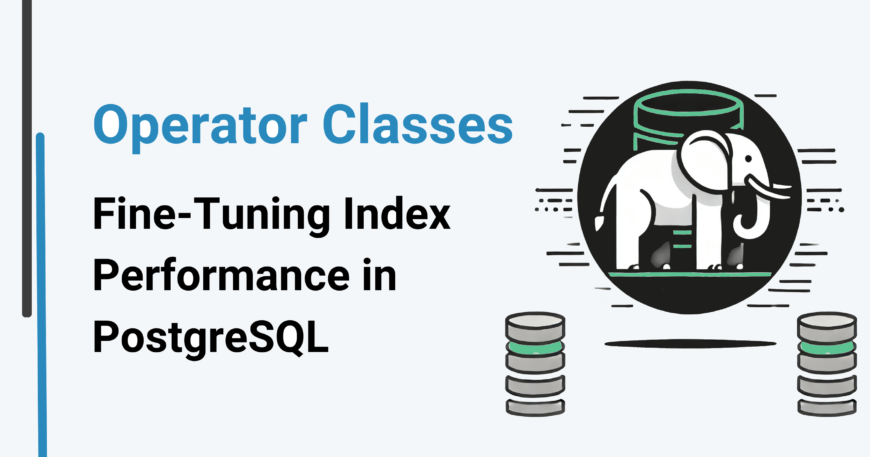Efficient data retrieval is crucial in any production environment, especially for databases handling heavy traffic and large datasets. PostgreSQL’s operator classes are a powerful but often overlooked tool for fine-tuning index performance. They allow you to control how PostgreSQL compares data within an index, helping to streamline searches and improve query efficiency in ways that default settings simply can’t match.
What Are Operator Classes in PostgreSQL?
An operator class in PostgreSQL is essentially a set of rules that defines how data in an index should be compared and sorted. When you create an index, PostgreSQL assigns a default operator class based on the data type, but different types (like text or geometric data) often have multiple classes to choose from. Selecting the right operator class allows PostgreSQL to work with your data in a way that better matches your search, sort, and retrieval needs.
For example:
- Text: Operator classes can control whether a search is case-sensitive or case-insensitive.
- Geometric Data: For location-based data, operator classes can compare things like distance or spatial relationships.
Choosing the right operator class can make a measurable difference in how quickly and efficiently your queries run, particularly when dealing with large datasets or complex data types.
Why Operator Classes Matter in Production Databases
In a production setting, performance optimization is critical, not merely a nice to have. While default operator classes work fine for general use, choosing specific classes can bring serious speed and efficiency gains for certain use cases. Here’s where they add the most value:
- Faster Text Searches: Tailor searches to be case-sensitive or case-insensitive based on what makes sense for your data.
- Geometric Data Efficiency: Use spatially-optimized comparisons for location-based data, like finding points within a certain radius.
- Custom Data Types: For specialized data types, custom operator classes ensure that comparisons are handled logically and efficiently.
Examples of Operator Classes
Case-Insensitive Text Search
Imagine you are building a production app where users search for names, and case-sensitivity isn’t important. PostgreSQL’s default btree operator class for text columns is case-sensitive, meaning it will treat John and john as different values.
To make searches case-insensitive, you can use the text_pattern_ops operator class:
CREATE INDEX idx_username_ci ON users (username text_pattern_ops);This index will speed up case-insensitive searches, like:
SELECT * FROM users WHERE username = 'john';Without an optimized operator class, each search might require extra processing to handle case sensitivity, which can slow down response times—especially when dealing with millions of rows.
Optimizing Geometric Data Queries
In location-based applications (like maps or delivery services), geometric data types are common. Suppose you have a POINT column for store locations and need to find all stores within a specific radius of a user’s location. Using an operator class like point_ops optimizes distance-based comparisons.
CREATE INDEX idx_store_location ON stores (location point_ops);With point_ops, PostgreSQL can handle distance calculations efficiently, ensuring location-based queries run smoothly. This is crucial when response time directly impacts the user experience.
Efficient Indexing for Custom Data Types
Creating a custom operator class in PostgreSQL requires a bit of groundwork, including defining operators that work with the custom data type. The following example is a simplified way to show how an operator class could be used for an encrypted_text type. This example assumes a basic encryption method (like hashing) that allows comparisons without decryption. In practice, you’d likely need to use cryptographic libraries and functions that PostgreSQL can call.
Step 1: Define the Custom Data Type
Let’s assume we have an encrypted_text type that represents hashed strings.
CREATE DOMAIN encrypted_text AS bytea;Here, we are using bytea (binary data type) to store encrypted or hashed data.
Step 2: Create Comparison Functions for Encrypted Data
You would need a function to compare two encrypted values. Let’s say that for hashed values, equality (=) is the only operator we need.
CREATE FUNCTION compare_encrypted_text(a encrypted_text, b encrypted_text)
RETURNS boolean AS $$
BEGIN
RETURN a = b; -- This is simplified; in reality, you might involve hash comparisons
END;
$$ LANGUAGE plpgsql IMMUTABLE;
Step 3: Create the Operator Using the Comparison Function
We now define an operator that PostgreSQL can use in indexing and query comparisons.
CREATE OPERATOR = (
LEFTARG = encrypted_text,
RIGHTARG = encrypted_text,
PROCEDURE = compare_encrypted_text
);
Step 4: Define the Operator Class
Now we can define the operator class for our encrypted_text type, telling PostgreSQL that it should use this class in indexes for encrypted_text columns.
CREATE OPERATOR CLASS encrypted_text_ops
DEFAULT FOR TYPE encrypted_text USING btree AS
OPERATOR 1 =;
In this operator class:
- DEFAULT FOR TYPE encrypted_text specifies that this operator class is the default for encrypted_text columns.
- USING btree means this class works with B-tree indexes.
- OPERATOR 1 = tells PostgreSQL to use our equality operator (=) for comparisons in this index.
Step 5: Create an Index Using the Custom Operator Class
Now we can create an index using encrypted_text_ops.
CREATE INDEX idx_encrypted_text ON sensitive_data (hashed_value encrypted_text_ops);This index now allows for efficient, indexed searches on encrypted_text fields without needing to decrypt the data. Queries can now use the index for comparisons, which saves processing power and helps secure sensitive information.
How to Choose the Right Operator Class
When deciding on an operator class, consider the following:
- Data Type: Start by assessing the data types you are working with—operator classes are specific to data types.
- Query Patterns: Think about the types of queries you run most frequently. If you need case-insensitive text searches or spatial distance checks, choose classes that cater to those needs.
- Performance Goals: Operator classes can address specific performance bottlenecks, so benchmark before and after to confirm the benefit.
- Indexing Strategy: Indexes add storage and processing costs, so choose operator classes that directly support your data access patterns to avoid excess overhead.
Benefits of Operator Classes in Production
Effective use of operator classes can yield significant benefits in a production environment:
- Speedier Queries: Customized comparison rules allow PostgreSQL to process queries more efficiently.
- Lower Processing Costs: Operator classes reduce the need for extra processing on each query by applying predefined rules.
- Optimized Resource Use: More efficient indexes mean less CPU and memory consumption, crucial in high-traffic applications.
- Better User Experience: Faster queries improve the user experience, especially for applications reliant on real-time data retrieval.
In production environments, these benefits translate directly to cost savings, better hardware utilization, and a smoother experience for end users. Operator classes may require some up-front setup, but they offer a substantial return on investment in both performance and efficiency.
Best Practices for Implementing Operator Classes
- Benchmarking: Always benchmark your queries before and after applying an operator class to measure the impact.
- Use Query Plans: Tools like EXPLAIN and ANALYZE reveal how PostgreSQL’s planner executes queries with different operator classes, helping you understand the performance impact.
- Strategic Indexing: While multiple indexes with different operator classes can be beneficial, they also consume storage. Use operator classes thoughtfully to avoid unnecessary indexing costs.
Final Thoughts
Operator classes are a powerful but often underutilized feature in PostgreSQL. They let you define exactly how data should be compared and indexed, which can be a major advantage when working with specific data types or when application performance is a priority. By choosing the right operator class, you can optimize text searches, accelerate location-based queries, and improve the handling of custom data types.
For database administrators and developers, understanding operator classes is a valuable skill for fine-tuning PostgreSQL index performance and boosting query efficiency in production environments.





